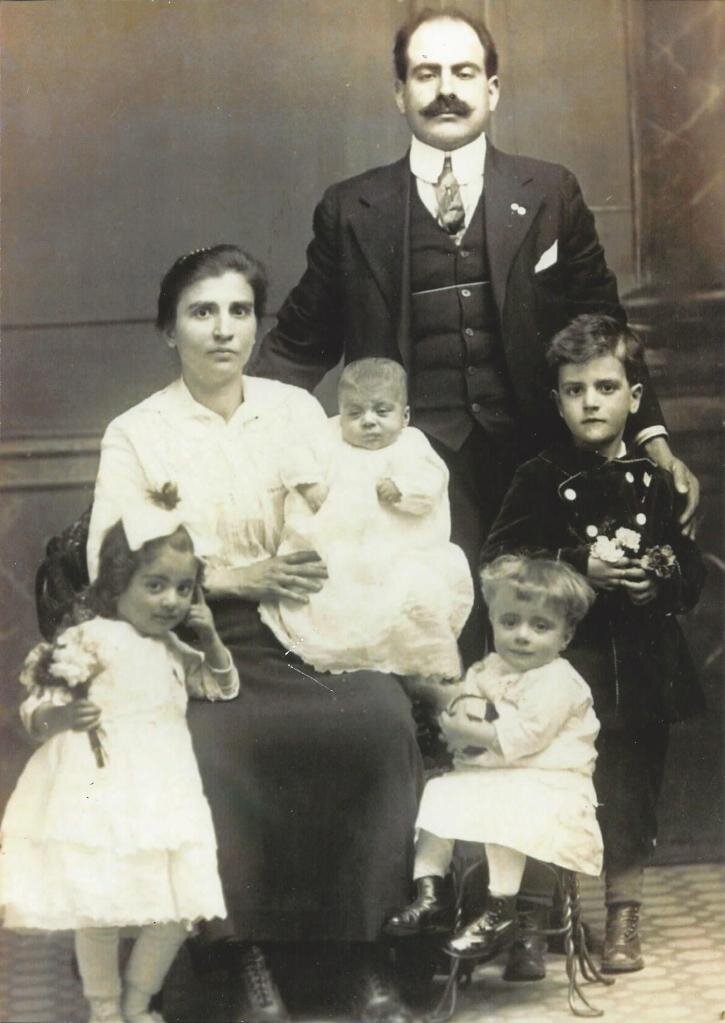So, you’re Italian-American. What’s the big deal?
The Giovinazzo Family
Everyone should be proud of their cultural heritage, even if you aren’t Italian-American. After all, not everyone can be an Italian-American. I guess my bias is pretty obvious. Someone once asked me if I could choose to be anything other than Italian-American, what would I like to be. I was shocked by such a horrible thought. The Italian-American culture is the confluence of two of the greatest civilizations ever to have existed. I wouldn’t want to be anything other than what I am.
Of course, those that aren’t Italian-American ask, so what’s the big deal. So, your grandparents came from Italy, who cares? I am glad you asked.
As I discussed in my post last week, If Italian-Americans aren’t Italian, what are they, there are many Italian-Americans who celebrate their Italian ancestry, calling themselves Italian without distinction from Italians who are born in Italy. As Italian-Americans, however, we should be less fixated on our Italianità and take greater pride in our Italianità-Americana. The United States is what it is due in part to the contributions of Italians and Italian-Americans. We have been essential participants in the development of our nation, from the discovery of the new world, through the American Revolution, the Civil War, the World Wars, and the modern era. Yet many, including some Italian-Americans, see us as late to the party, relatively new to the American dream.
I believe part of the issue is the image of the Italian immigrant. The young Vito Corleone in The Godfather, Part II, looking out the window while on Ellis Island with the Statue of Liberty reflected in the glass, is the iconic image of the Italian immigrant. While many Italians did come through this country via that route, the story of Italian-Americans did not begin there. Before 1900, there were nearly two million Italians and Italian-Americans. It will come as a shock to some, but many did not arrive through New York or Boston. In the late 1800s, many Sicilians came through New Orleans, for example.
When it comes to California, we got here before the rest of you! Italians established fishing communities up and down the western coast while it was still part of Mexico. When word made it back to Italy about the richness of California, even more immigrants came. They brought the crops they knew from back home; broccoli, bell peppers, eggplant, artichokes, and Sicilian lemons. Most importantly of all, they brought the knowledge of growing grapes and producing wine. By 1851, over 100 vineyards in the Los Angeles area were exporting approximately 7,200 cases of wine annually. This number rose to nearly four million by 1860. Through knowledge and hard work, these immigrants established the Southern California agricultural industry.
Sadly, much of our Italian-American history is forgotten, and we, their descendants, are the lesser for it.
Beyond their impact on the United States, I am proud of the bravery of our Italian-American predecessors. It is so easy today for us to hop on a plane and be in Italy in just a few hours that we forget the courage it must have taken to come to America. Most Italian immigrants came from Southern Italy and were common laborers. They probably had not seen much more of the world than the villages nearest their own. What must that have been like? To leave all that you knew behind. Crossing an ocean. Arriving in a land where you did not speak the language or even know how you would provide for yourself. I don’t know if I could have done what my grandparents did.
I am also proud of the values of the Italian-American community. Perhaps this is what troubles me most when people associate us with the Mafia. We were taught honesty and hard work. When my mother would wake me to go to school, like most kids, I would moan, “Ma, just five minutes more.” I knew the response before I asked, “You’ll sleep enough when you are dead. Get up!” In our house, my father worked, my mother worked, and when we were old enough, the kids worked. My mother, who I believed worked the hardest of us all, after pulling a full shift at the local mill, would come home, cook full meals (none of that frozen stuff), do the laundry, and clean the house.
Most importantly, my parents, who didn’t have an education, raised us to value learning. If I slacked off at school, my mother would give me a slap in the head, saying, “what do you want to do? Dig ditches when you grow up?” My parents expected their kids to do better than they did; they required it. In one room of our house was a bookcase from floor to ceiling filled with books. My father saw books as something precious.
These are just a few of the values that were passed down to my generation. There are so many more. I am sure that you have a long list that you can add as well.
These are the things that make me proud to be an Italian-American, to be the descendent of such good, brave people. As I close, I realize that my words fall far short of what I would like to say. If you are Italian-American, I am sure you know what I am trying to say. We are truly blessed.
To my friends who are not Italian-American, despite what I may have said in the opening lines of this post, we should all be proud of our heritage. We should all value those from whom we are descended. This, to me, is the essence and greatness of the United States, e Pluribus Unum – out of many one.
For more on Italian and Italian-American culture, read my book Italianità, The Essence of Being Italian.
